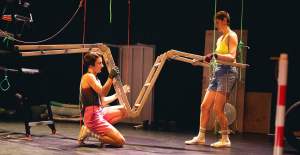The new Ecole 42 in Berlin-Neukölln is an unusual university: there are no teachers, no state-recognized qualifications, and applicants don't even have to show certificates. Nevertheless, the HR managers of large corporations can hardly wait until they can hire the first programmers who have been trained there. This is already the case at the 35 other Ecole 42 locations in 20 countries around the world. The Berlin school is financed by Volkswagen, Bayer, SAP, Microsoft, T-Systems and Capgemini. At the opening, WELT spoke to the HR directors Sabine Bendiek (SAP) and Gunnar Kilian (Volkswagen).
WORLD: Ms. Bendiek, the shortage of skilled workers is a big issue again, and there are also no software and IT experts. Where are the biggest gaps in SAP?
Sabine Bendiek: They are mainly with our partners, who advise customers on behalf of SAP, and with the customers themselves. We find the specialists we need ourselves because the SAP brand is so strong. For the economy as a whole, however, this is a major issue and there is concern that the shortage of skilled workers will become even worse. Not only is the demographic factor striking, but competition will continue to increase as digital skills are now in demand across all industries.
WORLD: Mr. Kilian, your software unit Cariad is looking for thousands of people with such digital skills. Can you find enough candidates in Germany?
Gunnar Kilian: We hired 1,500 software developers at Cariad this year alone, and we are growing in future fields such as batteries, autonomous driving and electromobility. This is possible because Volkswagen has great appeal worldwide and we also have good access to skilled workers through our strong brands. However, relying on this alone will not carry us into the future. We therefore started at an early stage to promote the potential of our employees with new qualification offers. For example, since 2019 we have been training up to 200 talented software developers every year at our Volkswagen software workshop ‘Faculty 73’. Three quarters of the graduates are Volkswagen employees. The '42 Wolfsburg' and the new '42 Berlin' complement our internal programs well. Both initiatives help to close the gaps in the STEM field. As a large, global company, we also have the advantage that we don't just have to cover our need for skilled workers in the German market. However, the situation is getting worse for medium-sized companies.
WORLD: Skilled workers from abroad are not a new topic for you. There has been a small community of Indians working at SAP in Walldorf for decades.
Bendiek: A small one? We employ 101 nations at the Walldorf/St. Leon Rot and are very diverse at our headquarters.
WORLD: How difficult is it to bring foreign workers to Germany?
Bendiek: We deeply believe in the benefits of diversity because the work results of diverse teams are better. But it is not the purpose in life to bring foreign skilled workers to Walldorf. We develop our software in a global network of SAP Labs. It has its largest location in Germany, the second largest in India and is present in many countries around the world. As employers, we can go where we find the right skills.
WORLD: So you are not dependent on people coming to Germany?
Bendiek: That's the big advantage of software development, yes. However, the global positioning does not change our commitment to Germany as a business location. We have to make two things happen here: One is that society, companies and politicians have to ensure that people from abroad feel comfortable and accepted here. The other is the challenge of a hardly digitized administration. How great the difficulties are became apparent this year when many highly qualified people fled from the Ukraine to Germany, some of whom had previously worked for us. If you only think about visas or the recognition of professional qualifications, there is still a lot to do.
WORLD: VW also has a long experience with foreign workers, for example when you think of guest workers. Now the federal government wants to make recruitment easier with a new points system. Will the VW help?
Kilian: Lowering the barriers to entry is a step in the right direction for the labor market in Germany. We ourselves have no plans to recruit foreign specialists on a large scale. People from over 100 nations work in Wolfsburg alone. Many of them are employees who work for one of our brands abroad and come to our locations in Germany for three or four years. So the planned reform does not affect us directly.
WORLD: Because, despite the previously restrictive immigration law, you bring skilled workers into the country through other channels?
Kilian: Let me answer the question in two parts. On the one hand, we are very successful in recruiting new employees on the German job market. So it's not primarily about bringing skilled workers into the country. On the other hand, as a global mobility provider, we are open to international talent and see diverse teams as an important lever for bringing exciting new perspectives into the company. Last year, Cariad founded a joint venture with a Berlin start-up to find the best minds in the tech field worldwide.
WORLD: Gerhard Schröder's government wanted to introduce a point system for immigrants 20 years ago, and it failed. Are large companies now so globalized that they no longer need the system?
Kilian: I don't want to rule out the possibility that Volkswagen will also have a need for skilled workers from abroad in the future. Currently this is not the case. However, we must keep a very clear eye on demographic developments. It is therefore good that the government is continuing to reduce the bureaucratic hurdles. We've been in a battle for the brightest minds for a long time, and this will only intensify in the years to come.
Bendiek: This competition for the brightest minds is an important part of our competitiveness. And it increasingly includes digital skills – which means that non-traditional further education courses such as an Ecole 42 are now a major topic. According to Bitkom, we have 137,000 vacancies in the digital sector in Germany. The skills shortage is real. We larger companies in particular are therefore very committed to training and further education in order to close the gap. But the state must also get involved, and digital topics must be given more weight in traditional training.
WORLD: This school obviously does something that state universities cannot. How big is the gap in the state education system?
Kilian: The 42 schools complement the traditional education system of technical colleges and universities, but do not replace it. I am convinced that we must open up education further and give as many talented people as possible access to future jobs in the STEM field. Otherwise we run the risk of being left behind in digitization in Germany. Our software academy therefore follows principles similar to those of the 42 coding schools and relies less on formal criteria such as degrees or previous knowledge. Rather, it is about the motivation, the individual skills and above all the mindset. At 'Faculty 73', for example, automotive mechatronics technicians have already taken the professional development to become programmers, or a 50-year-old physicist. However, there is one hurdle for both the '42' and the 'Faculty 73': the talents have to go through an intensive admissions process. Anyone who has managed this has promising career opportunities after graduation. At 'Ecole 42', many students are poached by companies before they have even completed the program. The sponsor is a non-profit association that we support as a donor. Students are free to choose where to go.
WORLD: So you have to advertise yourself here as an employer?
Killian: Exactly. We both believe that our companies are so attractive that young people like to come to us afterwards. At the same time, it is an incentive to further increase our attractiveness as an employer, for example by creating modern working time models that allow maximum flexibility.
WORLD: Would it be good for Germany to look less at diplomas and more at potential?
Bendiek: We have to keep an eye on both. Official qualifications will always play an important role in Germany. But I believe that we have to open up and that skills should play an equal role. Especially in the area of software development, you can easily test your skills in the application process. What I find exciting about Ecole 42 is that it's not just about developing technical skills, but also about so-called soft skills. They are an important prerequisite for the path of constant change that all companies follow. Only employees who are able to deal with feedback, who can and want to learn for life will contribute to our success in the future. You can learn that better in a school like this than in a university education.
WORLD: Do you think that Germany is not digital enough and that is why we need such schools?
Bendiek: We've come a long way, and there's a lot going on in the economy. In state training, however, we should invest more in digital education. It starts with the question of how many teachers are actually interested in the topic. You have to arouse enthusiasm for using new technologies. In Germany we are rightly proud of our engineering culture and our ability to find systematic solutions to difficult problems. We're great at it and it's an important part of our culture. Only as an overtone does it claim that there must be zero mistakes. It is important to learn from mistakes. Software development only works in a culture that allows for mistakes. Many companies are currently working on this change.
WORLD: Not that easy for a company like VW. Nobody wants mistakes in the car.
Killian: Absolutely right. When we talk about error culture at Volkswagen, we don't mean the high quality standards for our products, services and performance. But in the software field there is a different way of thinking. Error culture increases the innovative power and serves the agile transformation. At Volkswagen, we want to anchor this way of thinking in other areas as well - from development and training through to human resources. We are currently introducing a new SAP system in my department. This will bring a big change, also in the way we work together. After all, technology ultimately revolves around people. This is also one of the reasons why we are committed to new educational paths in the STEM field such as the 42 coding schools.
"Everything on shares" is the daily stock exchange shot from the WELT business editorial team. Every morning from 5 a.m. with the financial journalists from WELT. For stock market experts and beginners. Subscribe to the podcast on Spotify, Apple Podcast, Amazon Music and Deezer. Or directly via RSS feed.

 B:SM will break its investment record this year with 62 million euros
B:SM will break its investment record this year with 62 million euros War in Ukraine: when kyiv attacks Russia with inflatable balloons loaded with explosives
War in Ukraine: when kyiv attacks Russia with inflatable balloons loaded with explosives United States: divided on the question of presidential immunity, the Supreme Court offers respite to Trump
United States: divided on the question of presidential immunity, the Supreme Court offers respite to Trump Maurizio Molinari: “the Scurati affair, a European injury”
Maurizio Molinari: “the Scurati affair, a European injury” Irritable bowel syndrome: the effectiveness of low-carbohydrate diets is confirmed
Irritable bowel syndrome: the effectiveness of low-carbohydrate diets is confirmed Beware of the three main sources of poisoning in children
Beware of the three main sources of poisoning in children First three cases of “native” cholera confirmed in Mayotte
First three cases of “native” cholera confirmed in Mayotte Meningitis: compulsory vaccination for babies will be extended in 2025
Meningitis: compulsory vaccination for babies will be extended in 2025 When traveling abroad, money is a source of stress for seven out of ten French people
When traveling abroad, money is a source of stress for seven out of ten French people Elon Musk arrives in China to negotiate data transfer and deployment of Tesla autopilot
Elon Musk arrives in China to negotiate data transfer and deployment of Tesla autopilot Patrick Pouyanné, CEO of TotalEnergies, is very reserved about the rapid growth of green hydrogen
Patrick Pouyanné, CEO of TotalEnergies, is very reserved about the rapid growth of green hydrogen In the United States, a Boeing 767 loses its emergency slide shortly after takeoff
In the United States, a Boeing 767 loses its emergency slide shortly after takeoff A charred papyrus from Herculaneum reveals its secrets about Plato
A charred papyrus from Herculaneum reveals its secrets about Plato The watch of the richest passenger on the Titanic sold for 1.175 million pounds at auction
The watch of the richest passenger on the Titanic sold for 1.175 million pounds at auction Youn Sun Nah: jazz with nuance and delicacy
Youn Sun Nah: jazz with nuance and delicacy Paris Globe, a new international theater festival
Paris Globe, a new international theater festival Skoda Kodiaq 2024: a 'beast' plug-in hybrid SUV
Skoda Kodiaq 2024: a 'beast' plug-in hybrid SUV Tesla launches a new Model Y with 600 km of autonomy at a "more accessible price"
Tesla launches a new Model Y with 600 km of autonomy at a "more accessible price" The 10 best-selling cars in March 2024 in Spain: sales fall due to Easter
The 10 best-selling cars in March 2024 in Spain: sales fall due to Easter A private jet company buys more than 100 flying cars
A private jet company buys more than 100 flying cars This is how housing prices have changed in Spain in the last decade
This is how housing prices have changed in Spain in the last decade The home mortgage firm drops 10% in January and interest soars to 3.46%
The home mortgage firm drops 10% in January and interest soars to 3.46% The jewel of the Rocío de Nagüeles urbanization: a dream villa in Marbella
The jewel of the Rocío de Nagüeles urbanization: a dream villa in Marbella Rental prices grow by 7.3% in February: where does it go up and where does it go down?
Rental prices grow by 7.3% in February: where does it go up and where does it go down? Even on a mission for NATO, the Charles-de-Gaulle remains under French control, Lecornu responds to Mélenchon
Even on a mission for NATO, the Charles-de-Gaulle remains under French control, Lecornu responds to Mélenchon “Deadly Europe”, “economic decline”, immigration… What to remember from Emmanuel Macron’s speech at the Sorbonne
“Deadly Europe”, “economic decline”, immigration… What to remember from Emmanuel Macron’s speech at the Sorbonne Sale of Biogaran: The Republicans write to Emmanuel Macron
Sale of Biogaran: The Republicans write to Emmanuel Macron Europeans: “All those who claim that we don’t need Europe are liars”, criticizes Bayrou
Europeans: “All those who claim that we don’t need Europe are liars”, criticizes Bayrou These French cities that will boycott the World Cup in Qatar
These French cities that will boycott the World Cup in Qatar MLS: new double for Messi who offers victory to Miami
MLS: new double for Messi who offers victory to Miami PSG-Le Havre: Ramos on his way, Kolo Muani at the bottom of the hole… Favorites and scratches
PSG-Le Havre: Ramos on his way, Kolo Muani at the bottom of the hole… Favorites and scratches Football: Vasco da Gama separates from its Argentinian coach Ramon Diaz
Football: Vasco da Gama separates from its Argentinian coach Ramon Diaz F1: for the French, Ayrton Senna is the 2nd best driver in history ahead of Prost
F1: for the French, Ayrton Senna is the 2nd best driver in history ahead of Prost

















